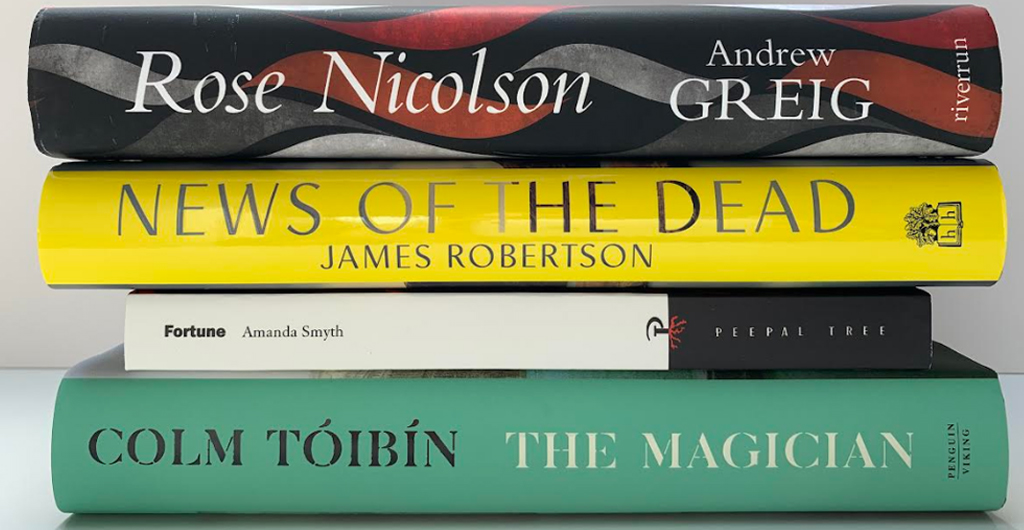Shortlist for 2022 Walter Scott Prize announced
Media Release – The judges of the Walter Scott Prize for Historical Fiction have announced a shortlist of four books going forward for the £25,000 award. The shortlist is:
- ROSE NICOLSON Andrew Greig (Riverrun)
- NEWS OF THE DEAD James Robertson (Hamish Hamilton)
- FORTUNE Amanda Smyth (Peepal Tree Press)
- THE MAGICIAN Colm Tóibín (Viking)
Featuring two Scots, one Irishman and an Irish-Trinidadian, the shortlist is the first in the prize’s thirteen-year history not to include an English writer and the first to be composed of four books. Settings include the riven and violent Scotland of the 1570s; a fictitious Highland glen through three different eras; the Caribbean oil rush of the 1920s; and twentieth-century Europe, seen through the life of one of its most celebrated writers, Thomas Mann.
The judges said:
‘Debate at Walter Scott Prize meetings is always lively. Hard choices must be made. But informed, as always, by the WSP’s criteria of ambition, innovation, enduring appeal and quality of writing, the four books on our shortlist shone brightly in this year’s firmament. We hope readers will celebrate the art and craft of each, and enjoy four very different tales very differently told.’
First awarded in 2010 to Hilary Mantel’s Wolf Hall, and sponsored by the Duke and Duchess of Buccleuch, the Walter Scott Prize for Historical Fiction honours the inventor of the historical fiction genre and Buccleuch kinsman, Sir Walter Scott. The prize judging panel comprises Katie Grant (Chair), Elizabeth Buccleuch, James Holloway, Elizabeth Laird, James Naughtie and Kirsty Wark.
The winner receives £25,000, and each shortlisted author receives £1,500, making the Walter Scott Prize among the richest fiction prizes in the UK. Its previous winners are Hilary Mantel and Sebastian Barry (both twice winners), Andrea Levy, Tan Twan Eng, Robert Harris, John Spurling, Simon Mawer, Benjamin Myers, Robin Robertson, and Christine Dwyer Hickey.
The winner will be announced at a special event at the Borders Book Festival on Friday 17th June 2022, which also honours the winners of the prize’s counterpart for young writers, the Young Walter Scott Prize.
The shortlisted authors will be taking part in live online video interviews for the prize during the month of May. For more information please visit the website or the prize’s YouTube channel.
About the shortlisted books
ROSE NICOLSON Andrew Greig (Riverrun)
The judges said:
‘Rose Nicolson opens with the fall of Edinburgh Castle to the Reformers and the hanging of Kirkcaldy of Grange at the Mercat Cross. The year is 1573 and the gruesome scene is witnessed by a boy, William Fowler. The novel tracks the subsequent years of the able and ambitious Fowler, the son of a Protestant father and a Catholic mother, as he leaves Edinburgh for study at St Andrews, and his increasing entanglement in the perilous political tides overwhelming Scotland. Fowler soon encounters James VI, George Buchanan and many of the other men on the treacherous political chessboard of late sixteenth-century Scotland. But his muse is the enigmatic Rose Nicolson whose friendship is inspiring but potentially lethal.’
NEWS OF THE DEAD James Robertson (Hamish Hamilton)
The judges said:
‘Glen Conach, James Robertson’s fictitious setting for News of the Dead, is a remote Scottish glen, rain-swept and harshly beautiful, where centuries pass slowly and legends are born. Here, three remarkable people have lived at different times – Conach, an Iron Age saint, Sandy Gibb, a light-fingered literary adventurer of the nineteenth century, and Maja, a girl of today with secrets of her own. The lives of these three, and the brilliantly drawn characters who surround them, are shaped by the glen and the myths that inhabit it. James Robertson is such a master at evoking landscape that we can hear the wind in the heather and smell the smoke of the peat fires. This is a novel to be richly savoured.’
FORTUNE Amanda Smyth (Peepal Tree Press)
The judges said:
‘1920s oil-rush Trinidad, with “black puddles … pooling at the foot of a tree; swirling on the skin of the Godineau river … running free like honey”. And just like a bee, along comes Eddie Wade, a man in search of a fortune and on whom fortune bestows and withdraws her bounties. Fortune’snarrative spark is the Dome fire of 1928 when an exploding gusher killed seventeen people, but like all top-class historical novelists, Amanda Smyth creates a past in which nothing is certain. A masterclass in narrative tension, in the economy – every detail earns its place – and in the miraculous power of a writer to transport, Fortune is a cracking story told by a cracking storyteller.’
THE MAGICIAN Colm Tóibín (Viking)
The judges said:
‘It is a courageous endeavour for any writer to attempt to dramatise the life of an earlier major novelist, especially when that novelist has written so much about his own life. Yet this is the task that Colm Tóibín has undertaken in The Magician. He has tried to grasp the entirety of Thomas Mann’s convoluted life and times, while the memories of Death in Venice and The Magic Mountain run like an old film in the background. The book is thus huge in scope but also intimate in feeling, dealing as it does with Mann’s homosexuality fighting for space with his six exuberant children. And a life in America we had no knowledge of. Tóibín writes with a lyrical style which belies the length of the book, and as to why it is called The Magician, read on! ‘



